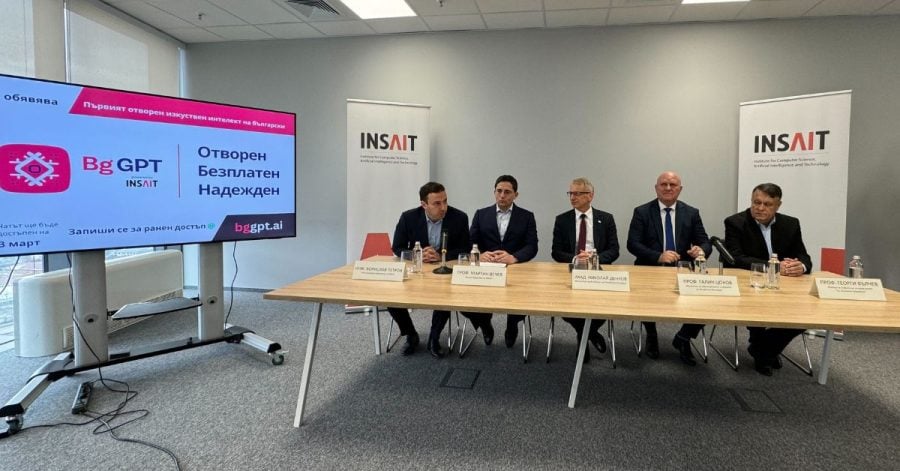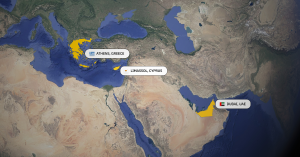Only have 1 minute? Here are 3 key takeaways from the piece:
- The first Bulgarian large language model, BgGPT, was announced today by INSAIT. It was created specifically for the Bulgarian state, users, public and private organizations.
- BgGPT will be launched on the 3rd of March for the general audience for free, while institutions will have priority to sign up in advance.
- INSAIT is working on its further development, focused on implementing it in public and educational institutions.
The Institute for Computer Science, AI and Technology (INSAIT) officially announced today the launch of the first Bulgarian language model, BgGPT. It is going to be publicly available from the 3rd of March at bggpt.ai. The priority would be given to public, educational, and science institutions, as well as to business.
The unveiling was attended by the Bulgarian Prime Minister Nikolay Denkov, the Minister of Education and Science Prof. Galin Tsokov, and the rector of Sofia University “St. Kliment Ohridski” Prof. Georgi Valchev.
With this, Bulgaria becomes one of the few countries with a separate AI language model. It is a strategic project for the country, aiming to enhance the acceptance of artificial intelligence in various institutions, especially in education. BgGPT is going to answer different tasks and questions, similar to OpenAI’s ChatGPT and Google’s Bard. The model is specifically designed for the Bulgarian language. The first version of BgGPT was trained on over 3 billion Bulgarian sentences and consists of 7 billion parameters.
Unlike similar global platforms though, BgGPT is not a corporate property and can be used freely by public and private organizations. The model behind BgGPT will also be released freely with a permissive license (Apache 2.0), which will enable commercialization. The institute is planning a technical event aimed at the Bulgarian tech ecosystem in February to demonstrate the capabilities of the model and how it can be used by businesses to create their own applications on top of it.
BgGPT’s initial project research began in 2020 under the leadership of Prof. Martin Vechev, Professor of Computer Science at ETH Zurich. He is also a founder and architect of INSAIT. The aim for 2024 is to continue the development of an AI computing center, attracting international partners.
INSAIT is a collaboration between Sofia University “St. Kliment Ohridski”, ETH Zurich, and EPFL Lausanne. Backed by $100M from the Bulgarian government and additional funding from SiteGround, Amazon Web Services (AWS), Google, Bulgarian entrepreneurs, and DeepMind, alongside business angels Vassil Terziev, Bogomil Balkansky, Ivan Osmak, Atanas Simeonov, Nedelcho Spasov, Stanimir Vassilev, Svetozar Georgiev, Hristo Hristov, Lubo Minchev, and Ivo Evgeniev.
INSAIT’s Milestones. A Timeline
April 2022 – Official launch of INSAIT. Created in partnership with ETH Zurich and EPFL Lausanne, INSAIT is structured as a special unit of the Sofia University “St. Kliment Ohridski”. With the launch INSAIT is already backed with $100M from the Bulgarian government, $6.5M from SiteGround, $3.75M from Amazon Web Services (AWS), $3M from Google, $550K from Bulgarian entrepreneurs, and $285K from DeepMind, alongside business angels Vassil Terziev, Bogomil Balkansky, Ivan Osmak, Atanas Simeonov, Nedelcho Spasov, Stanimir Vassilev, Svetozar Georgiev, Hristo Hristov, Lubo Minchev, and Ivo Evgeniev.
May 2022 – INSAIT announces its international AI Ph.D. program with professors from CMU, EPFL, ETH Zurich, MIT, and Yale.
July 2022 – Prof. Luc Van Gool joins INSAIT as a faculty member thanks to the financial support provided by Bulgarian IT company SiteGround, as a part of its total investment of €6M for the development of the institute.
September 2022 – INSAIT received a $1.5M grant from the global cloud computing company VMware to attract both faculty of international scholars and researchers and Ph.D. students. This collaboration aims to result in breakthrough discoveries in critical areas such as security and privacy in AI, programmable networks, and the data economy.
August 2023 – INSAIT’s first deep tech spin-off, Martian Lawyers Club (MLC), secures $2.2M in pre-seed funding to innovate the gaming industry.
September 2023 – INSAIT joins The European Laboratory for Learning and Intelligent Systems (ELLIS). ELLIS Unit in Sofia is the first one in Eastern Europe.
November 2023 – INSAIT is the first Eastern European institution to join the Global AI Alliance. Founding members include IBM, Meta, AMD, Anyscale, CERN, Cleveland Clinic, Cornell University, Dartmouth University, Dell Technologies, EPFL, ETH Zurich, Hugging Face, Imperial College London, INSAIT, and Intel among others. The goal of the global AI Alliance is to support open innovation and open science in AI.
December 2023 – Amazon Web Services (AWS) announced a donation of $1M for INSAIT. The funding will be used to support formal methods research. The cooperation also establishes a strategic partnership between the researchers and engineers of INSAIT and Amazon Web Services.








